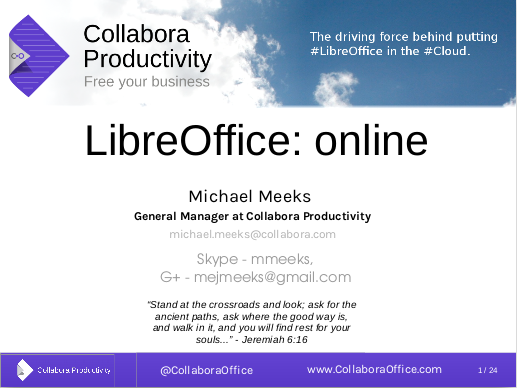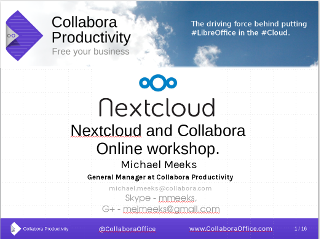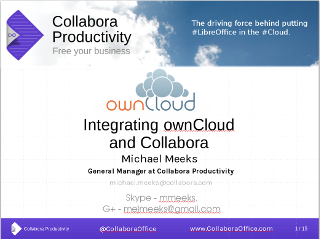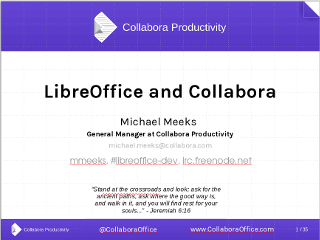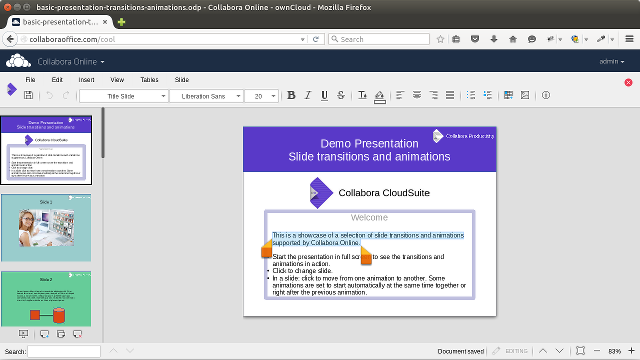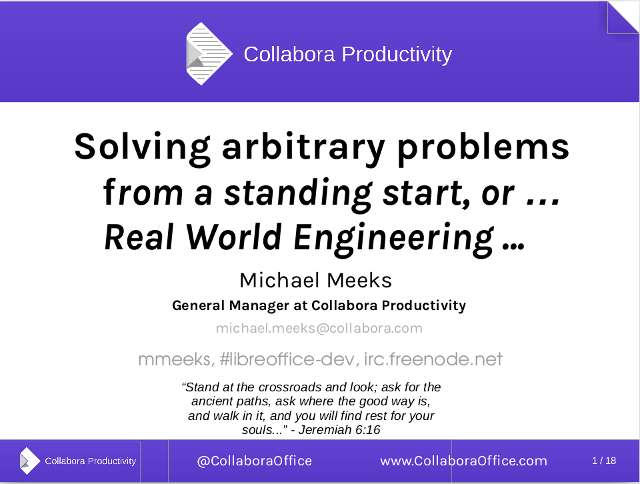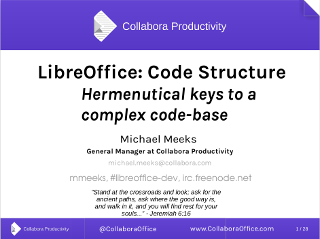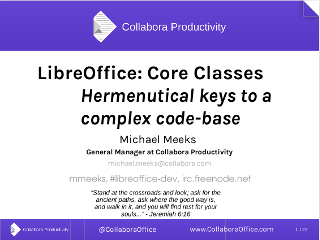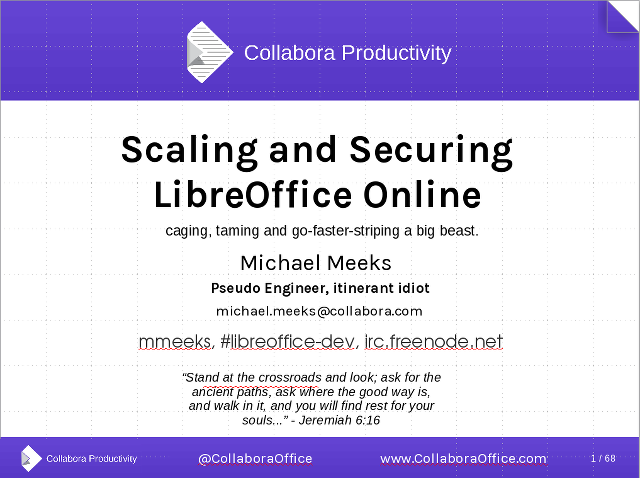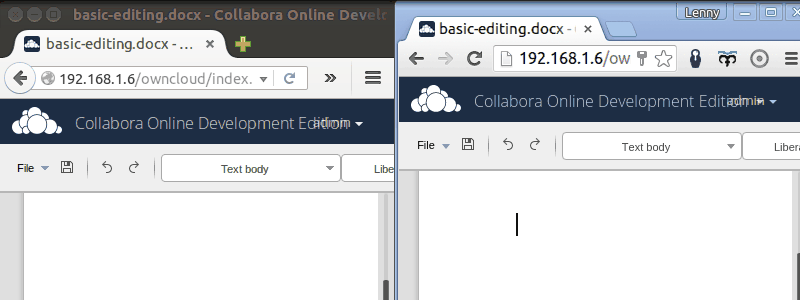Today
we release
CODE 2.0 which includes Collaborative Editing. We've done a huge amount
of work since CODE 1.0 - and many of these improvements have been back-ported
for our customers & community, but it is perhaps well to credit the authors
in one place and survey progress over the last six months.
There have been 1200 commits to 'online' and around 500 to the LibreOffice
core since we branched for 1.0. While we celebrate and credit the fantastic work
of the LibreOffice community without which there could be no LibreOffice Online - it
is clear that Collabora is the architect and driving force behind putting LibreOffice
in the Cloud - we have 14 online commits from non-collaborans. On the flip side we're
eager to change that - that there is lots of low hanging fruit here, for web developers,
and we love contributions. Anyhow - to the details:
Testing & Debugging
- To 2.0 our unit tests improved very significantly with 230
commits from ~all developers; catching all manner of horrible corner case
errors from crashing lokits, to out of disk-space conditions.
- Another very powerful tool created by Laszlo Nemeth is the
<ctrl>-<alt>-<shift>-D client JS debugging mode pictured:
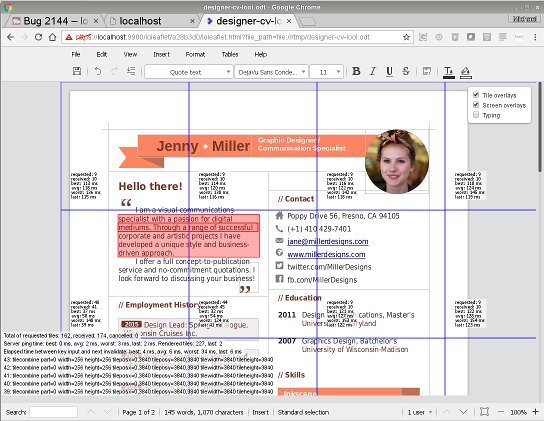
This has a large number of really useful development features:
- Showing where the last series of invalidations
occured, the most recent in block red, older with red
borders - notice how LibreOffice has quite efficient
invalidation / re-rendering behaviour.
- Can't be seen in this shot - but rendering in blue
invalidated tiles waiting for refresh, and showing which
tiles are served from the cache in yellow.
- Lots of measures of latency, count of tiles rendered etc.
- Logging of all protocol messages to and fro to the JS
console when this mode is enabled
- a 'Typing' check-box, you can use to get stock text
typed in at your cursor for stress testing.
These invaluable debugging features make isolating the locus of
a problem extraordinarily easier.
-
WOPI operation timing and measurement improvements - to
allow us to improve load performance thanks to Pranav Kant along
with improved logging to better capture the volume of diagnostic
output we want thanks to Jan 'Kendy' Holesovsky & Ashod Nakashian.
-
Session record and replay - an extremely useful
diagnostic approach for logging and reproducing user problems, of
course with horrible privacy implications but great for debugging,
and also
benchmarking:
$ ./loolstress --bench --iter=100 /tmp/looltrace.gz
Iterations: 100
Latency best: 67 microsecs, 95th percentile: 4740 microsecs.
Tile best: 52 microsecs, rendering 95th percentile: 1446 microsecs.
Cached best: 34 microsecs, tile 95th percentile: 67 microsecs.
Rendering power: 55.4497 MPixels/sec.
Cache power: 826.327 MPixels/sec.
Concurrency
While each LibreOffice Kit process is fundamentally single-threaded
and isolated into its own jail, we serve many hundreds of clients per WSD
daemon involving a certain amount of concurrency excitement. In
2.0 Ashod Nakashian removed a per-connected-client thread count
from the slave kit processes significantly simplifying things, he
also did a lot of lock auditing, session cleanup and admin console state
synchronisation improvements.
Meanwhile Pranav Kant ensured that users' WOPI credentials
are tracked such that the right user is tagged as having hit the explicit
'save' (of course we also auto-save regularly).
Other cleanups and fixes here include switching to un-named pipes
thanks to Tor Lillqvist, catching and fixing
races around tile rendering (Ash) and avoiding a race when loading
the same document multiple times concurrently thanks to Kendy.
Performance &Memory
Performance and interactivity is significantly improved in 2.0
with a large number of improvements. Tile requests are now prioritized
such that tiles near active cursors are rendered and returned before
others thanks to Ash and Kendy who also re-wrote the tile request,
combining, de-combining, and re-aggregating in the core to ensure that
we render the largest area possible to avoid the costs of repeated
in-document image scaling. Ash also added a tile versioning
scheme to ensure that we always get the latest, correct tile under
heavy load and avoid duplicate painting. Kendy and Tor added
a prioritisation scheme for presentation slide thumbnailing to improve
interactivity.
Other improvements are to use LD_BIND_NOW to have
all the linking performed by the forkit process once and not again,
Ash also improved the forkit child spawning and lifecycle
management.
Pranav profiled and optimized the WOPI GetFileInfo usage
to reduce it to a single call from three, some implementations have
unexpectedly expensive implementations of this. Marco Cecchetti -
made SSL support run-time configurable to make it easier to
configure SSL off-load / acceleration in large setups and Ash
added compiled-in limits to avoid misleading enterprise users that CODE
is suitable for deployment at scale without support. CODE
remains firmly targetted at home users, Henry - added a warning for too many users/connections.
User Experience
The most obvious improvement in 2.0 is collaborative editing,
which has a lot of UX elements to enable users to see other users' cursors,
selections, with name popups when they are active, or mouse-overed, and more
thanks to Henry Castro. There are also a number of nice new elements
such as the user-list pop-up in the bottom toolbar containing the
colors of users' cursors thanks to Pranav you can also click to
jump to that user's position in the document which is neat.
Pranav also dunged out lots of the shared editing pieces from 1.0.
Meanwhile Miklos Vajna did lots of heavy-lifting around Undo & Redo
which gets significantly more complex with multiple users. Our eventual solution
is of building an infrastructure for simple de-confliction, while also
allowing a Repair Document power mode to unwind the rare
<ctrl>-a, <space> issues. This seems to work
really well under our normal collaborative editing conditions.
Various general cleanups have been implemented such as re-locating,
and anti-aliasing the progess-bar and spinner thanks to Pranav,
who also added git hashes to help->about dialog - with Andras
adding cgit web links to make QA versioning trivial.
Andras also did lots of l10n enablement work to the Admin Console,
slide layouts, status bar, colour pickers, menus and context menus, while
Pranav added context sensitive enablement to menubar items.
Meanwhile Kendy switched us to use larger icons, and
improved the toolbar look, while Andras made it easy to escape
menus with that key. Meanwhile Henry added status bar items to all
of the component - with much requested features like calc selection quick
summing, and powerful word-count in writer.
Calc Improvements
One beautiful win for calc users is Henry's tweak to highlight
row and column headers to show cursor and selection positions. He also took
the time to implement lots of other nice wins around row & column headers
from drag & drop re-sizing, double-click to optimial size, as well as
adding context menus to show & hide rows & columns.
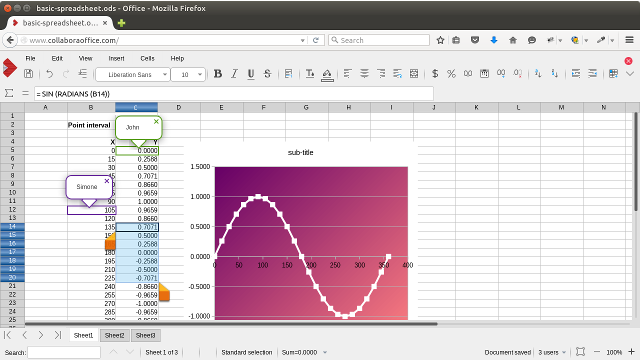
Meanwhile Marco fixed a pernicious range issue with
page-up/down to make editing smoother while Pranav fixed some
formula-bar ergonomics and Henry tackled the interactive auto-sum
functionality. Henry also extended the toolbars and menus to include
sorting, simple number formats, merge & center, wrap text and more.
Meanwhile, for this release, Andras disabled zooming in calc -
interestingly our competition don't do this either - and the non-linear
co-ordinate space caused by row height rounding was causing real issues.
Writer Improvements
Meanwhile in writer Andras significantly extended the format
menu allowing simple page size, line-spacing, alignment and other simple
formatting. Pranav improved the context menus exposed
on in-document comments, to allow replying and deleting, while Andras
added foot & end-notes, page & column break insertion, as well as
Table of Contents and image wrap & anchor context menu items for one of
our customers.
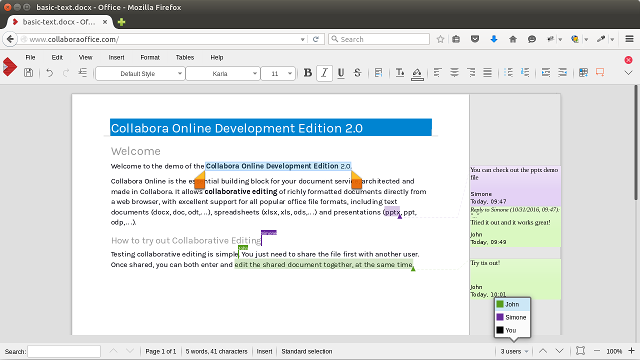
General UX bits
Lots of other miscellaneous but useful wins went in such as Henry
fixing <ctrl>-f to focus the 'find' toolbar and Pranav mapping
<ctrl>-s to .uno:Save. A volunteer Feyza Yavuz added the insert
comment toolbar button. Faruk Uzun implemented a draggable insert table
toolbar button grid, and Pranav customized a nice read-only mode for
users without edit permission.
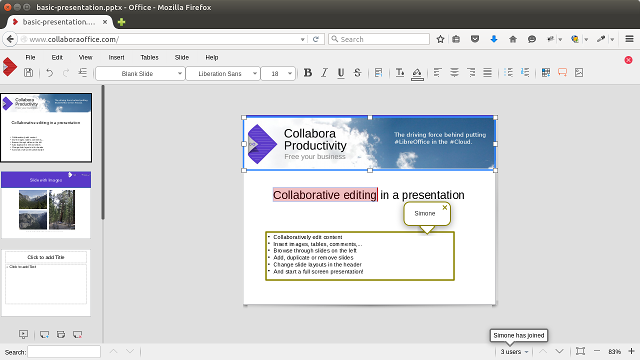
Collaboration
Collaboration was the largest, and the most substatial part of the 2.0 work.
It is hard to list everything that was done there though - it is
infrastructure work, many parts of that are implementation details, it was
done incrementally, and also with some trial & error on the way; really
more of a research task than just plain development.
Conceptually, we wanted to reuse as much of existing code as possible - as we
always do - which was luckily possible for the collaboration too. LibreOffice has
a feature that allows users to open multiple views of the same document: Try
Window -> New Window in your desktop LibreOffice. You will see
that this already gives you multiple cursors, and multiple selections.
We "just" mapped the multiple document views to the multiple users. That
means, on the server, there is only one document open, but with many views -
one view for one user.
Of course, the hard part was to make it all fit together: Each user (view)
needs to see the cursors and selections of the other users (views) which is
something that LibreOffice did not provide previously. There were many bugs
when update in one view did not trigger update of the other view (which is
probably because the feature itself has not been much used until now). Lots
of code had to be updated and fixed. And also, lots of decision had to be made
about the updates - what change has to be broadcasted to all the views ? vs.
which changes apply only to the current view, and what to other views than
the current one. Not to mention all the corner cases when one of the views
is closed in the middle of the broadcast to all the views, etc. You get
the picture.
To mention the most important parts of this work:
- Extension of the multiple-view rendering infrastructure and the
appropriate changes in the LibreOfficeKit API had to be done before anything
could have been exposed to the daemon and JavaScipt parts. (Miklos, Ash)
- Then it was necessary to broadcast the events (like selection
changes) accordingly, and make the JavaScript UI render it. (Miklos, Ash,
Pranav, Henry, Marco)
- To optimize the amount of messages that are sent from the server
to the client, work had to be done to elide redundant invalidations. On the
other hand, there were cases where the invalidates were missing, and had to be
added. (Miklos)
- In the UI, tracking & rendering of multiple, colored cursors
had to be implemented. (Pranav, Ash)
- Another tough nut to crack was Calc - with its concept of cell
cursors; multiple cursors, concurrent cell editing had to be implemented or
fixed in many areas. (Marco)
Miscellaneous
- To communicate between the main webpage that embeds the iframe
and the content of the iframe, the postmessage API had to be much improved.
(Pranav)
- Due to the asynchronous nature of everything, new requests
may come at any time - so it is necessary to stop accepting new
requests during termination. (Ash)
- A new API for change tracking & colors had to be implemented to
be able to have the document cursor always black for the current user, but
other colors synchronized for the other editors.(Miklos, Pranav)
- The WOPI discovery XML was extended to provide read-only access
for formats we cannot export eg. Visio, and many more such formats
were added (Miklos)
- Sometimes it is necessary to cancel the tile requests - for
example when the user scrolls quickly, and far away from the location where he
or she was editing previously. But there is an exception - we must not cancel
requests for slide thumbnails. (Tor)
- For the JavaScript part of the solution, we use several JavaScript
libraries, but in order to be self-contained, we cannot just reference them -
instead, they are shrinkwrapped and packed all together. We also made our CSS
much more browser-friendly - bundled and browserify'ed it. (Pranav)
- One of the conditions that can negatively affect the entire
solution is when the server running Online gets low on storage space - a
warning was implemented to handle that. (Tor, Pranav)
- All websocket URLs were unified so that it is easy to create HA
balancing rules. (Pranav)
- As browsers cache JavaScript and CSS, it was necessary to
start versioning all served assets, like l10n, images etc. in the path name
to avoid problems when upgrading from one version of Online to the
new one.(Pranav)
- Packaging pieces were updated, and various debian rules
improved. (Andras, Katarina Behrens (CIB))
- As the amount of code grows, the documentation becomes
increasingly important. Now all the classes have their doxygen
documentation. (Ash)
- To improve the user experience, the JavaScript dialogs were
migrated from simplemodal to vex (Pranav)
- Debuggability is important too. Due to the nature of the solution,
it is non-trivial to run the loolwsd daemon under valgrind; consequently a
make rule make run_valgrind was introduced to make its execution
under valgrind easier. (Ash)
- All the work that uses LibreOfficeKit was implemented in the
gtktiledviewer first, because it is much easier to implement it there: It
avoids most of the asynchronicity that is necessary in the communication
between the server and the JavaScript part. Thanks to that, gtktiledviewer
(and the underlying Gtk+ widget) was tremendously improved. There is a
large amount of functionality exposed that could be used to improve GNOME or
KDE document viewers and simple editors. (Miklos)
Bug fixes
Of course, on top of the new features, various people have contributed a
tremendous amount of bugfixes. To list the most important ones:
- Different views (for users who edit the same document concurrently)
can have different zoom levels, which is obvious from the user point of view,
but has many corner cases and usage scenarioas that may go wrong - now the
status bar zoom levels are correct across different views (Ash)
- It is important to handle permissions correctly. Now the
integrators can set whether the document should be read-only or read/write
easily, because we honour the WOPI UserCanWrite parameter (Pranav)
- The most substantial feature of Online is that the documents
are rendered the same with the same look and feel as in the desktop version.
To be able to do that, there were myriad tile rendering / invalidation fixes
needed (Ash, Miklos)
- The iframe with the menu, toolbar, document itself and the status
bar is non-trivial, and for the flawless user experience, many focus problems
were fixed. (Henry)
- Good logging and error reporting is essential for both for admins
(so that they know what to fix during the setup) and the users (so that they
know how to get their work done even in the non-ideal conditions - like
unstable netwerk). That lead to improved logging & user notification of
various errors (Tor)
- The loolwsd daemon needs quite a lot of control over the system,
because we spawn lots of child process, create chroots for them, etc. But for
security reasons, we don't want to use setuid of course - instead we set
only the capabilities that are missing; and had to check and warn when
capabilities are missing. Unfortunately Ubuntu 14.04 LTS doesn't support
these file-system capabilities.(Tor)
- Fixed X-WOPIOverride, a header that is used in the WOPI response.
(Aleksander Machniak (Kolab)), and handle unexpected WOPI URLs inncluding
spaces for a customer. (Pranav)
- The Calc (spreadsheet) and Impress (presentations) use a concept
of "parts" - they are the separate sheets in the Calc, or the slides in
Impress. Writer has pages - but they are only a flow of text that can easily
run from one to another, so we don't use that concept there, and it was
necessary to unwind Writer parts invalidation, and rendering. (Ash)
- The entire solution is highly asynchronous - the server must not
wait for the JavaScript clients that may easily go away (on connection loss,
user's action), and many race conditions had to be fixed - including races
between sheet switch and part setting etc. (Marco)
- Another race fixed was between rendering and invalidation
that caused missing last character typed from time to time. (Kendy)
- When the user does not edit the document, it goes inactive - the
changes are not sent until the user clicks the document again. This is to
save bandwidth and the server CPU. But of course, the views need a refresh on
UI re-activation. (Ash)
- The time before the document becomes inactive needed tuning for a
good user experience, so the idle time was increased after testing (Ash)
- We expect that potential attackers might want to try to inject
unknown or bad commands, and use that for the communication with the server,
so the input sanitisation was improved. (Pranav)
- Another related bugfix was related to potential guessing of the
location of the chroots, and the random directory creation was improved. (Ash)
- Resizing of the toolbars would sometimes trigger an infinite
layout loop - this was fixed. (Pranav)
Summary
While 99% of the code comes from Collabora, many thanks again to
everyone who contributed including the LibreOffice translation
community. As announced at the LibreOffice conference - we're
working hard to get a first up-stream release of LibreOffice Online
included into LibreOffice 5.3 - and to make daily image builds available
for testing as we move towards that.
We've done a huge amount of work here; this is just a short
summary of it, and it is an amazing privilege to be able to work with
such a talented set of developers at Collabora and across the wider
community around LibreOffice. Why not head to and
get involved with LibreOffice, or deploy the stable 1.0 version of Collabora Online in your
organization - while we harden Collabora Online 2.0 for your delectation.
Today we release LibreOffice 5.2.0, the next step in our journey, and what will become the
base of the increasingly stable 5.2.x series. There is a fine suite of
new features for people to enjoy - you can read and enjoy all the great news about the
user visible features
from many great hackers, but there are, as always, many contributors
whose work is primarily behind the scenes, and a lot of work that is more
technical than user-facing.
Some moons ago, the ESC decided to add some under-the-hood wiki
pages so that people could add their own credits: I encourage you to read
those here: 5.1
and 5.2.
There are lots of good things there, and it saves me reading and summarizing
~10k commits each release, but then again - that can be fun too. This is my
very quick attempt to make up for a year of inactivity on this front, and
pluck a few of the un-mentioned bits out of 17,734 commits (that is an average
of ~50 commits every day of the year) from liboffice-5-0-branch-point
to libreoffice-5-2-branch-point:
Developer Central
A great initiative of Norbert Thiebaud has been to collect
together most of the infrastructure and entry points that we have at TDF,
and build an attractive list of these to help those new to the project
find and use our tools and services. Checkout http://devcentral.libreoffice.org/:
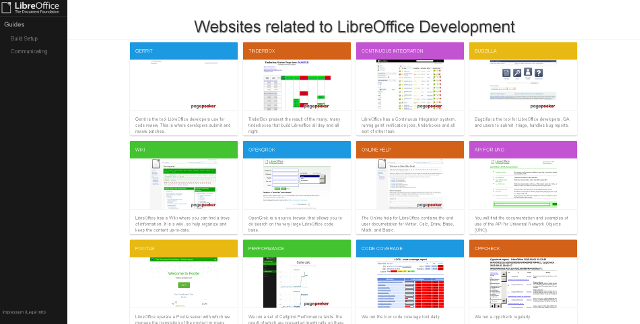
Replacing Vigra with Cairo
LibreOffice has been able to run in a headless mode, doing its own
pixel-bashing for a long time, and this is used intensively by both LibreOffice
Online and also the Linux / gtk3 port. It has been a neverending source of
amazement to myself and others that the (unreadable) template code using
Vigra produces rather poorly performing code for all manner of cases - and
needs special case optimization in the client code.
One of the great joys of LibreOffice 5.2 is the final replacement of vigra,
and the removal of the basebmp directory which allows us to use
native (and assembler accelerated on eg. ARM) cairo for pixel bashing. While
basebmp has served well and accelerated rendering for years, cairo also gives
us accelerated anti-aliased line rendering and more. Thanks to Caolán
McNamara (RedHat) for that.
Hardware Acceleration improvements
There were a large number of OpenGL and OpenCL improvements in
this time period.
- OpenGL got a much simplified rendering model - whereby
we render everything to a double buffered back-buffer texture, and blit
that to the screen at idle after re-paints are requested. This follows
similar work for Mac and now gtk3. This combined with some dynamic
adjustment of rendering priorities gives smooth re-painting and sizing
without visible re-drawing. This work also significantly simplified GL
context lifecycle and management.
- OpenGL and CL crash protection - due to a large number
of driver quality issues - we implemented a guard-zone that we enter and
exit before doing any GL or CL call - such that our crash handler can
detect a crash related to GL or CL, and in this case disable the
functionality on re-start.
- OpenCL and OpenGL sanity checking before real-use. To
avoid later functionality problems, particularly mis-calculation in
spreadsheets, whenever the CL driver version or LibreOffice version
changes we re-calculate a test sheet on load and check the results,
to detect mis-behaving CL implementations, and disable CL acceleration
if we get those. Similarly for OpenGL we batch compile and cache all
of our shaders to ensure there are no compile errors that could cause
problems later.
- OpenGL and CL black-listing code improvements, with
nice
cache/opengl_device.log files with details of your
drivers. After lots of work, it was discovered that Intel GL drivers
on Windows 7 were flaky beyond belief, so these were black-listed.
- Performance was much improved by combining shaders
interestingly the overhead of switching shader and associated program
state changes is very significant, such that using a single, rather
complex shader that handles lots of
cases is faster than several very simple shaders one per case. So
we merged all of our non-texture, and texture drawing into two
large combined shaders - containing a
switch()
statement.
- In combination with this, queueing and batching work to
aggregate many drawing operations, into a single GL / program
invocation also gave a large win. Combined with text atlas
improvements, this allows us to defer the drawing of large
numbers of glyphs to a single GL call.
- Other GL accelerations including using a shader to
calculate 64bit CRCs of images (to aid comparison), caching
of our MVP matricees and doing co-ordinate space transformations
on the GPU. Doing grey-scale conversion and shader based (poly)line
rendering.
- The lack of a good windows physical font rendering API lead
us to implement DirectWrite support for text rendering,
thanks to Tim Eves (SIL) and Martin Hosken (SIL).
- Lots of other various wins and fixes - implementing
invert, improved anti-aliasing, XOR rendering, angle-based polygon
sub-division, improved clipping, better
vcldemo test
paths, improved native widget rendering, faster clipping. There
was a chunk of work put into lifecycle fixing, and shutdown
cleanup, and many bug fixes.
Thanks to all those with more than five commits to
vcl/opengl,
opencl/ and
sc/source/core/opencl/ here:
Tomaž Vajngerl (Collabora), Tor Lillqvist (Collabora),
Noel Grandin (Peralex), Stephan Bergmann (RedHat),
Caolán McNamara (RedHat), Markus Mohrhard,
Marco Cecchetti (Collabora)
Performance improvements are hard to screenshot; but important
nonetheless. We maintain performance regression tests (running under valgrind) at http://perf.libreoffice.org/ - which
really helps to pin-point and repair issues as they arise.
One big-win in 5.2 was Armin Le Grand (CIB)'s work to improve
our thread-pool, and use it to accelerate the 3D software renderer -
which gives a particularly noticable speedup for 3D chart re-rendering.
Crash Reporting
Markus Mohrhard has done some simply excellent work on
crash reporting - to help us find the most frequent crashes on Windows.
While many Linux distributions have had similar tools deployed
for years, covering Windows is important too. The implementation re-uses
Google's Breakpad
to create minidumps which are analyzed on the server side and charted
prettily at http://crashreport.libreoffice.org/stats/
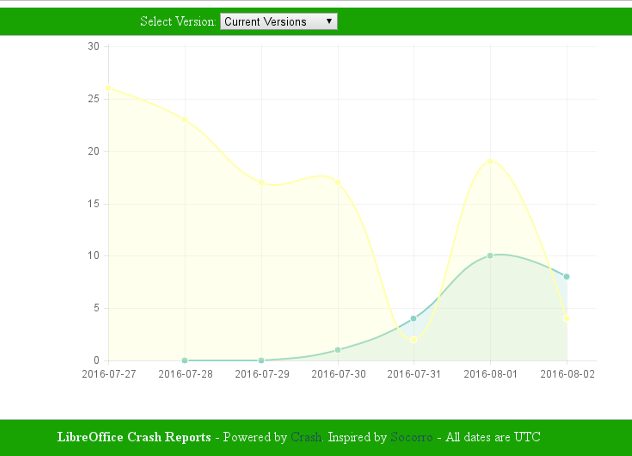
Markus would love some help from someone with web development skills
to help improve the front-end, and analytic / querying / data presentation
here. Please poke the developer list libreoffice@lists.freedesktop.org.
This work has already lead to several vital fixes of the top crashers
that have been seen in the wild, using good data to nail the worst
quality issues. Thanks to Markus Mohrhard, Caolán McNamara (RedHat),
and Miklos Vajna (Collabora) who have commits referencing crashreport URLs.
Ongoing Code quality work
Work is ongoing around code quality in many areas, with 196
or so cppcheck fixes thanks to
Caolán McNamara (RedHat), Julien Nabet, Jochen Nitschke,
Noel Grandin (Peralex), Michael Weghorn, Takeshi Abe,
Giuseppe Castagno and others.
Caolan and the RedHat guys manage to keep the Coverity scan count, and
crash-testing (loading and saving ~91k documents to many formats) counts
at or around zero at all times, as well as doing fuzzing and other cleanup.
Lifecycle Improvements
Continuing the VclPtr re-work where we added strong referenced
lifecycle to all our widgets, Dipankar Niranjan in
tdf#96888
has cleaned out all of the old & awful 'dog-tag' work that tried to get
lifecycle right in VCL, using much cleaner references.
In more recent times Yurtoglu, Melike Ayse and
Noel Grandin have worked to abstract the VclReferenceBase
and apply this to Menus, to ensure they are correctly lifecycle managed.
Thanks too to
Jocken Nitschke for internalizing the DeletionListener
tdf#97525
which should be removed when we eventually reference count the sal/
backend resources.
Other great work to exorcise manual refcounting comes from
Thomas Arnhold, Daniel Robertson, Noel Grandin, Aleksas Pantechovskis
and especially Xisco Fauli for their work on
tdf#96525 and
tdf#89329,
converting lots of manually reference counted or copy-on-write structures
to using the nice cow_wrapper template; as well as converting
pImpl pointers to use std::unique_ptr. This reduces the scope for
programmer error, and missed corner cases and allows us to make
copy-on-write ref-counting thread-safe if necessary. There are 140 cases
fixed, and about 68 refcounting instances still needing love.
Unit testing
We continued to build and execute more critical unit tests
this year - each one stopping some suite of regressions from ever returning.
Grepping for the relevant TEST and ASSERT macros we continue to grow the
number of unit tests:
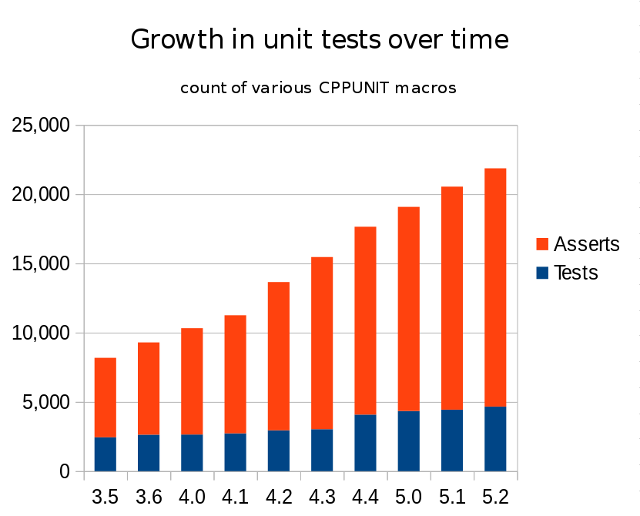
Our ideal is that every bug that is fixed gets a unit test to stop it ever
recurring. With around 1800 commits (20% up on last year), and over
one hundred committers to the unit tests in the range it is hard to list
everyone involved here, apologies for that; what
follows is a sorted list of those with over 20 commits to the relevant
directories in both core.git and online.git:
Miklos Vajna (Collabora), Caolán McNamara (RedHat),
Stephan Bergmann (RedHat), Ashod Nakashian (Collabora),
Noel Grandin (Peralex), Markus Mohrhard,
Tor Lillqvist (Collabora), Eike Rathke (RedHat),
Michael Stahl (RedHat), Henry Castro (Collabora),
Chris Sherlock, Varun, Andrea Gelmini, Jan Holesovsky (Collabora),
Takeshi Abe, Łukasz Hryniuk, Xisco Fauli, Mike Kaganski (Collabora)
and those with over 10 commits get an honourable mention too -
unit tests are important !
David Tardon (RedHat), Katarina Behrens (CIB),
Marco Cecchetti (Collabora), Tomaž Vajngerl (Collabora),
Oliver Specht (CIB), Zdeněk Crhonek, Mark Hung,
Justin Luth, Julien Nabet, Aleksas Pantechovskis,
Pranav Kant (Collabora)
LibreOfficeKit Improvements
The LibreOfficeKit API is the foundation of the Android App, GNOME
Documents, and the ongoing LibreOffice Online work, and a lot changed in the
last year. The two main building blocks of the LOK API are the methods of the
exposed objects, and the callback types. Since 5.0, the following new methods
has been added:
lok::Office::getFilterTypes() allows obtaining an up
to date list of filter name - MIME type pairs, added for GNOME
documents.lok::Office::setOptionalFeatures() and
lok::Office::setDocumentPassword() allows opening
password-protected documents.lok::Office::freeError() allows releasing an error
string allocated by the API.lok::Document::getPartPageRectangles() allows
obtaining the size and position of pages in a Writer document.lok::Document::getTileMode() allows writing clients
that work with both the new (Cairo) and the old (Vigra) headless
backend (see above).lok::Document::initializeForRendering() has been
extended to allow key-value style options while initializing, like
Writer's hide whitespace mode.lok::Document::postMouseEvent() has been extended to
handle click buttons and modifiers.lok::Document::postUnoCommand() has been extended to
get a callback when the result of an executed UNO command is
ready.lok::Document::getTextSelection() and
lok::Document::paste() has been added to handle copy and
paste.lok::Document::getCommandValues() has been added to
query possible values for UNO commands (font and style names, Calc
row/column header details, Calc cell cursor).lok::Document::setVisibleArea() has been added to be
able to do correct page up / page down.lok::Document::createView(),
lok::Document::destroyView(),
lok::Document::setView(),
lok::Document::getView() and
lok::Document::getViews() have been added as an initial
support for collaborative editing.lok::Document::renderFont() has been added to help
providing font previews.lok::Document::getPartHash() has been added to help
clients tracking reordered slides.lok::Document::paintPartTile() has been added to allow
stateless rendering of different parts of a document.
And the following new callbacks are available:
LOK_CALLBACK_DOCUMENT_SIZE_CHANGED: Size of the
document changed.LOK_CALLBACK_SET_PART: The current part number is
changed.LOK_CALLBACK_SEARCH_RESULT_SELECTION: Selection
rectangles of the search result when find all is performed.LOK_CALLBACK_UNO_COMMAND_RESULT: Result of the UNO
command execution.LOK_CALLBACK_CELL_CURSOR: The size and/or the position
of the cell cursor changed.LOK_CALLBACK_MOUSE_POINTER: The current mouse pointer
style.LOK_CALLBACK_CELL_FORMULA: The text content of the
formula bar in Calc.LOK_CALLBACK_CONTEXT_MENU: Context menu structure
(after a right-click).
Thanks to
Andrzej Hunt (Collabora), Ashod Nakashian (Collabora), Henry
Castro (Collabora), Jan Holesovsky (Collabora), Michael Stahl (RedHat),
Mihai Varga (Collabora), Miklos Vajna (Collabora), Oliver Specht (CIB) and
Pranav Kant (Collabora) for these.
Miscellaneous
An outcome of our Turkish Hackfest
in Ankarah was discovering that LibreOffice would not even build in the tr_TR.UTF-8
locale. Interestingly toupper('i') != 'I' in this locale; fun cf.
tdf#99589.
Thanks to Krishna Keshav, Gökhan Gurbetoğlu and Apurva Priyadarshi
for the fixes.
A large number of UX / usability papercuts were fixed and improved
such as keyboard shortcuts, consistent display issues, mis-sized
and mis-placed controls, and some regressions from UI file conversion.
Thanks to Caolán McNamara (RedHat), Akshay Deep, Regina Henschel,
Maxim Monastirsky, Jürgen Funk (CIB), Bubli Behrens (CIB),
Samuel Mehrbrodt (CIB) & Jay Philips.
QA / bugzilla
One metric we watch in the ESC call is who is in the top ten in the
freedesktop Weekly
bug summary. Here is a list of the people who have appeared more than ten
times in the weekly list of top bug closers in order of frequency of appearance:
V Stuart Foote, Adolfo Jayme, Cor Nouws, Maxim Monastirsky, Eike Rathke (RedHat),
raal, m.a.riosv, Julien Nabet, Caolán McNamara (RedHat),
Miklos Vajna (Collabora), Beluga, Alex Thurgood, Michael Meeks (Collabora),
Buovjaga, Yousuf (Jay) Philips, Joel Madero, Samuel Mehrbrodt (CIB),
Markus Mohrhard, Timur, Jean-Baptiste Faure, Xisco Faulí, Aron Budea,
tommy27, Michael Stahl (RedHat), Heiko Tietze, David Tardon, Laurent BP
With many thanks to everyone else that helped to close and triage so many bugs
for this release.
Jenkins / CI
Thanks fundamentally to Norbert Thiebaud - we now have not only
great Jenkins / CI infrastructure, with gerrit integration - but we have a
much enlarged and more reliable hardware build farm that encourages people to
use Jenkins to check their work before pushing, in turn increasing the
quality and reliability of master. This year we've seen the benefits of
running our full suite of make check unit tests on our debugging
builds under Linux.
The work Jenkins did for just master in the six month run up to the
5.2 branch point we have 34,124 tinderbox builds covering seven configuration
across linux, mac and windows. With 27,737 builds covering three platforms tested
on our gerrit infrastructure. This is for the CI managed hardware, there are
a number of other volunteer run Tinderbox builders. This is extremely helpful for keeping master
build-able and usable, making it easy for newbies to get stuck in. With
60,000 builds for 8k commits we are doing a lot of loop test and validation
of the LibreOffice code at CI time.
Ongoing German Comment redux
Some of my favorite heroes are those who open up the code so
that others can work on it ! One of the key tasks there is translating
the remaining German
Comments (a list). The last four thousand lines seem to defy
translation - why this graph should flatten like this - I have simply
no idea. All patches from German speakers who love to finish things -
much appreciated. Many thanks to those who stuck with it, with more
than 2 commits; in order of commit count: Albert Thuswaldner, Phillip Sz,
Thomas Klausner, Chris Sherlock, Philipp Weissenbacher &
Matteo Casalin.
We are now down to seven modules left:
include, reportdesign, sc, sfx2, stoc, svx, sw
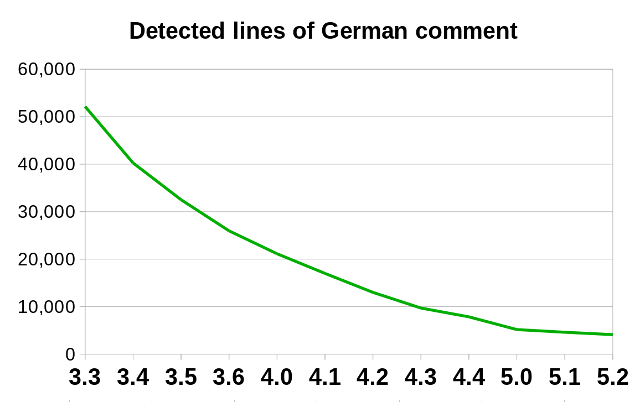
Windows XP
The 5.2.x releases run well on Windows XP, but we cannot be sure how
long our tooling will continue to target that platform. As such - while the ESC
has no concrete plans to drop Windows XP support, we are 'deprecating' it after
the 5.2.x series - meaning that having a modern C++ compiler and a modern
Windows build OS base-line have a higher priority. That means that in future
it is possible that future major LibreOffice releases may not run on Windows
XP; you have been warned. For now, there is no change here.
Getting involved
I hope you get the idea that more developers continue to find a home
at LibreOffice and work together to complete some rather significant work both
under the hood, and also on the surface. If you want to get involved there
are plenty of great people to meet and work alongside. As you can see individuals
('Assigned') make a huge impact to the diversity of LibreOffice (the colour legends on the right
should be read left to right, top to bottom, which maps to top down in the chart):

These charts, made so early in the month are still missing som individuals
and commits queued up in gerrit for review - hence the July numbers. In terms
of diversity of code commits, we love to see the unaffiliated volunteers
contribution by volume, though clearly the volume and balance changes with the
season, release cycle, and volunteers vacation / business plans:
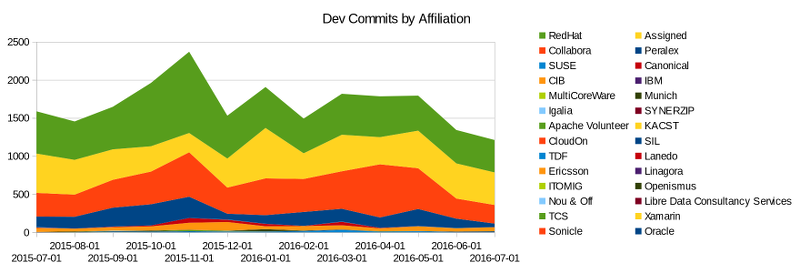
Naturally we maintain a list of small, bite-sized tasks which you
can use to get involved at our Easy Hacks
page, with simple build /
setup instructions. It is extremely easy to build LibreOffice, each easy-hack
should have code pointers and be a nicely self contained task that is easy to
solve. In addition some of them are really nice-to-have features or performance
improvements. Please do consider getting stuck in with something.
Another thing that really helps is running pre-release builds and
reporting bugs just grab and install a pre-release and
you're ready to contribute alongside the rest of the development team.
Conclusion
LibreOffice 5.2 is great; it is made by a set of developers
having fun, working together, and building an increasingly attractive
and beautiful Free Software Office suite, I hope you enjoy using it.
Thanks for reading, don't forget to checkout the user
visible feature page and thank you for supporting LibreOffice.
If I have missed your good work out (and this is a very
incomplete view based on a few hours of analysis) - please do add
yourself to the relevant wiki page and potentially mail me a unified
diff to this page; thanks !
Raw data
and
commit stats
built using our gitdm-config - are available for many of the above graphs.
In case it's not painfully obvious: the reflections reflected here are my
own; mine, all mine ! and don't reflect the views of Collabora, SUSE,
Novell, The Document Foundation, Spaghetti Hurlers (International),
or anyone else.
It's also important to realise that I'm not in on the Swedish Conspiracy.
Occasionally people ask for formal photos for conferences
or fun.
